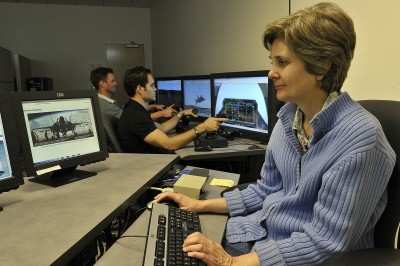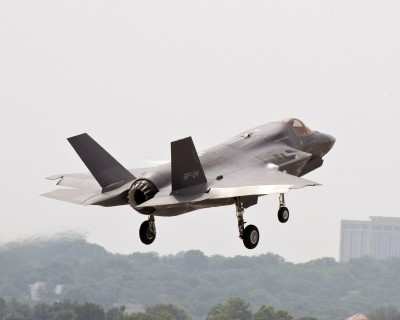Instructional Materials Support Core Training for F-35 Pilots,
Maintainers
The first block of "courseware" for the F-35 Lightning II has
been delivered to Eglin AFB in advance of the planned opening this
summer of F-35 Integrated Training Center at the base. The
electronic materials include all of the presentation materials that
classroom instructors will use to teach pilots how to fly the F-35,
and maintainers how to repair and support the aircraft. The
courseware also includes students' self-study materials and pilot
briefing materials used to support F-35 simulator and flight
training events.

Northrop Grumman, a principal subcontractor on the Lockheed
Martin-led F-35 industry team, delivered the first block of
courseware for maintainers in March, followed by the first block of
courseware for pilots in April. Both deliveries went to Lockheed
Martin's Simulation, Training and Support organization at Eglin
AFB.
"Training systems courseware provides the fundamental framework
for teaching pilots and aircraft maintainers how to prepare for the
F-35 mission or maintenance scenarios they're most likely to
encounter," explains Mark Tucker, vice president of tactical
systems and F-35 program manager for Northrop Grumman's Aerospace
Systems sector. "The goal is for every pilot and every maintainer
to reach the same level of knowledge about the jet, regardless of
where they started."
Northrop Grumman is responsible for developing the courseware
for pilots and maintainers for all three F-35 variants, plus any
specialized courseware requested by F-35 partner countries, he
added.

The current deliveries of courseware support the Block 0.5
software installed in the two F-35s produced during the first phase
of low rate initial production (LRIP1). Subsequent deliveries of
courseware will support the more advanced software currently being
installed in LRIP2 and LRIP3 jets.
According to Peter Leung, leader of Northrop Grumman's courseware
integrated product team, much of the company's expertise in
courseware derives from its experience as the Air Force's prime
contractor on the B-2 Spirit stealth bomber, where it had similar
training development responsibilities.
As with B-2, he explains, the company ensures the quality and
accuracy of the F-35 courseware by including three types of
reviewers in its development: (1) instructional specialists who
help organize the information in a way that people can learn most
effectively; (2) subject matter experts – typically former
pilots or maintainers – who help ensure that the course
materials convey the ideas in language and terms familiar to the
students; and (3) current military pilots or maintainers who ensure
that the material teaches the subject in a manner consistent with
military doctrine.

"It's a very disciplined, collaborative process aimed at
ensuring that our warfighters, regardless of their service
affiliation or training background, gain the knowledge and the
confidence to fly, maintain and support one of the most advanced,
most capable jets in the international inventory," said
Leung.
 Classic Aero-TV: In Praise of Alabamas Patriot Aircraft USA
Classic Aero-TV: In Praise of Alabamas Patriot Aircraft USA NTSB Final Report: Cirrus Design Corp SR22
NTSB Final Report: Cirrus Design Corp SR22 ANN's Daily Aero-Term (12.21.25): Dead Reckoning
ANN's Daily Aero-Term (12.21.25): Dead Reckoning ANN's Daily Aero-Linx (12.21.25)
ANN's Daily Aero-Linx (12.21.25) Aero-News: Quote of the Day (12.21.25)
Aero-News: Quote of the Day (12.21.25)





